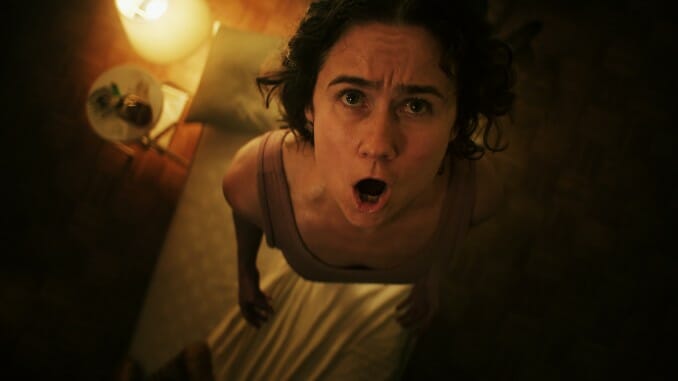Knocking‘s Horror Moodily Employs the Bumps in the Night

About a month ago, I moved into a new apartment to live by myself for the first time in half a decade. The boxing up, the unboxing (or lack thereof), the anxious pets and depressive puttering—everything that goes along with the process ate away at my psyche like moths at stored sweaters. Not least of which were the sounds: Unfamiliar noises in foreign rooms, they could mean anything from a call to the super to an annoying new normal that you just have to live with. With Knocking, Swedish director Frida Kempff and writer Emma Broström adapt Johan Theorin’s short story into a horror that captures and exacerbates this experience in all its environmental and psychological discomfort. As boxed-in as its heroine Molly (Cecilia Milocco), Knocking works best as the kind of mood piece that keeps you up at night with phantom sensations (wait, did you hear that?) before it spirals into something more frantic and less satisfying.
While you nod, nearly napping, suddenly there’ll come a…knocking. Recently released from a psychiatric facility, Molly is plagued by a knock on her new ceiling and recurring dreams of a lost loved one. The dream-memories, comfortable and warm and luxuriant, are fantasies cursed to end, which Kempff portends with the kind of uncanny tone-shifts that make you realize a dream’s turning into a nightmare and there’s nothing you can do to stop it. Then she wakes up. Back in her shitty apartment. Alone, except for her booze and that goddamn knocking noise coming from the ceiling.
This noise becomes a tense and spooky haunting—and one, by virtue of its locale, that turns its focus from an unfeeling healthcare system (which stands in for a larger lack of empathy for our neighbors) to the actual experience of the person who needs help in the first place. Is someone knocking on their floor? Does Molly need to help? Or does she just need help? Milocco, all tight lips, furrowed brow and flop sweat, is an eminently sympathetic vessel of stress as she tries to figure this out. Kempff, who loves shooting Milocco’s face close up and blown out, makes the mystery all the more personal and aggrieving by choosing to angle many of Knocking’s most memorable shots up to and down from that damnable spot up on the ceiling. In an apartment so dark and isolated that you can feel the seasonal affective disorder set in, Molly looks up to the source of the noise and, as the perspective shifts, it looks right back at her.
From this quasi-supernatural sound springs the buried demons of paranoia, madness, pride and loss—all heightened by the stressors of a well-realized environment and haunted by realistic threats like gaslighting and domestic violence. Molly visits neighbors about the knock to no avail, but if you can’t trust your own senses…well, it’s a more attractive (if bittersweet) proposition that the world is lying to you than that you’re being fooled by your own mind. The brutalist building and its stark concrete halls offer no respite; her packed-up apartment starts off sadly alcoholic and quickly accumulates the debris of an obsessive mind.
-

-

-

-

-

-

-

-

-

-

-

-

-

-

-

-

-

-

-

-

-

-

-

-

-

-

-

-

-

-

-

-

-

-

-

-

-

-

-

-








































